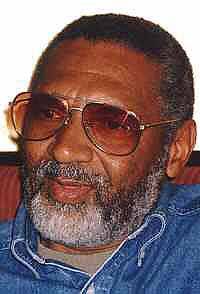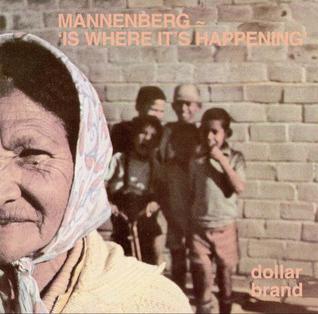Related Research Articles

Hugh Ramapolo Masekela was a South African trumpeter, flugelhornist, cornetist, singer and composer who was described as "the father of South African jazz". Masekela was known for his jazz compositions and for writing well-known anti-apartheid songs such as "Soweto Blues" and "Bring Him Back Home". He also had a number-one US pop hit in 1968 with his version of "Grazing in the Grass".

Abdullah Ibrahim is a South African pianist and composer. His music reflects many of the musical influences of his childhood in the multicultural port areas of Cape Town, ranging from traditional African songs to the gospel of the AME Church and Ragas, to more modern jazz and other Western styles. Ibrahim is considered the leading figure in the subgenre of Cape jazz. Within jazz, his music particularly reflects the influence of Thelonious Monk and Duke Ellington. He is known especially for "Mannenberg", a jazz piece that became a notable anti-apartheid anthem.

Hotep Idris Galeta was a South African jazz pianist and educator. His legal name at birth was Cecil Galeta, but according to local custom he was more commonly known as a child and young man as Cecil Barnard, his father's first name being used instead of a last name.
Jeremiah "Kippie" Morolong Moeketsi was a South African jazz musician, notable as an alto saxophonist. He is sometimes referred to as "the father of South African jazz" and as "South Africa's Charlie Parker". He played with and influenced some of South Africa's great musicians, including Jonas Gwangwa, Abdullah Ibrahim, Miriam Makeba and Hugh Masekela.

Amandla!: A Revolution in Four-Part Harmony is a 2002 documentary film depicting the struggles of black South Africans against the injustices of Apartheid through the use of music. The film takes its name from the Zulu and Xhosa word amandla, which means power.
Cape jazz is a genre of jazz that is performed in the very southern part of Africa, the name being a reference to Cape Town, South Africa. Some writers say that Cape jazz began to emerge in 1959 with the formation of The Jazz Epistles, many of whom were from Cape Town, including Abdullah Ibrahim, then known as Dollar Brand. Cape jazz is similar to the popular music style known as marabi, though more improvisational in character. Where marabi is a piano jazz style, Cape jazz in the beginning featured instruments that can be carried in a street parade, such as brass instruments, banjos, guitars and percussion instruments.
South African jazz is the jazz of South Africa.

Zim Ngqawana was a South African flautist and saxophonist. He was later known as Zimology.
Moses Taiwa Molelekwa was a South African jazz pianist.
Jonas Mosa Gwangwa was a South African jazz musician, songwriter and producer. He was an important figure in South African jazz for over 40 years.

King Kong (1959) was a landmark South African jazz-influenced musical, billed at the time as an "all-African jazz opera".

African River is a 1989 album by South African jazz pianist Abdullah Ibrahim..
The African Jazz Pioneers is a South African group that espouses the music of the 1950s, fusing big band jazz with township marabi sounds. Band leader and saxophonist Bra Ntemi Piliso, who wrote most of the Pioneers' songs, opened the field of composition to the band's younger musicians.

"Mannenberg" is a Cape jazz song by South African musician Abdullah Ibrahim, first recorded in 1974. Driven into exile by the apartheid government, Ibrahim had been living in Europe and the United States during the 1960s and '70s, making brief visits to South Africa to record music. After a successful 1974 collaboration with producer Rashid Vally and a band that included Basil Coetzee and Robbie Jansen, Ibrahim began to record another album with these three collaborators and a backing band assembled by Coetzee. The song was recorded during a session of improvisation, and includes a saxophone solo by Coetzee, which led to him receiving the sobriquet "Manenberg".

Dorkay House is situated on Portion 168 of Farm Turnfontein at 5–7 Eloff Street, Johannesburg, South Africa. It was constructed in 1952 and was designed by architect Colman Segal (1923–1988). It takes its name from the original owner, Dora Kotzen.

Grrr is the second studio album by South African musician Hugh Masekela. It was recorded in New York City and released in 1966 via Mercury Records. Grrr was re-released on LP in 1968 on Wing/Mercury labels as Hugh Masekela and on CD in 2003 on Verve label. On this record, he seamlessly fuses jazz ideas with the rhythmically complex South African music known as Mbaqanga.

Hugh Masekela & The Union of South Africa is the thirteen studio album by South African jazz trumpeter Hugh Masekela released via Chisa Records label in May 1971. The album was re-released on CD in 1994 on MoJazz label.

The apartheid regime in South Africa began in 1948 and lasted until 1994. It involved a system of institutionalized racial segregation and white supremacy, and placed all political power in the hands of a white minority. Opposition to apartheid manifested in a variety of ways, including boycotts, non-violent protests, and armed resistance. Music played a large role in the movement against apartheid within South Africa, as well as in international opposition to apartheid. The impacts of songs opposing apartheid included raising awareness, generating support for the movement against apartheid, building unity within this movement, and "presenting an alternative vision of culture in a future democratic South Africa."

Live at the Market Theatre is a double live album by South African jazz trumpeter Hugh Masekela. The record was released on 17 July 2007 via Four Quarters Entertainment label. The album consists of 15 tracks recorded in June 2006 during his two-and-a-half-hour concert in The Market Theatre in Johannesburg. A follow-up DVD was released on 31 July 2007.
Makwenkwe "Mackay" Davashe (1920–1972) was a South African musician. He achieved success as a saxophonist and composer with the Manhattan Brothers and later the Jazz Epistles.
References
- ↑ Merz, Christopher Linn (2016). "Tracing the Development of the South African Alto Saxophone Style". The World of Music. 5 (2): 31–46. ISSN 0043-8774. JSTOR 44651147.
- ↑ "IN PICTURES: Jazz Epistles reunite for two concerts", ENCA, 17 June 2016.
- ↑ "The Town Hall & Le Poisson Rouge Present The Jazz Epistles ft. Abdullah Ibrahim & Ekaya + Lesedi Ntsane with Dorothy Masuka feat. Bakithi Kumalo", Le Poisson Rouge, 27 April 2017.
- ↑ The Jazz Epistles at Front Row Tickets.com.
- ↑ "A Tribute to The Jazz Epistles –Abdullah Ibrahim & Ekaya featuring Freddie Hendrix, trumpet", University of Michigan.
- ↑ "Abdullah Ibrahim", MM Music Agency.